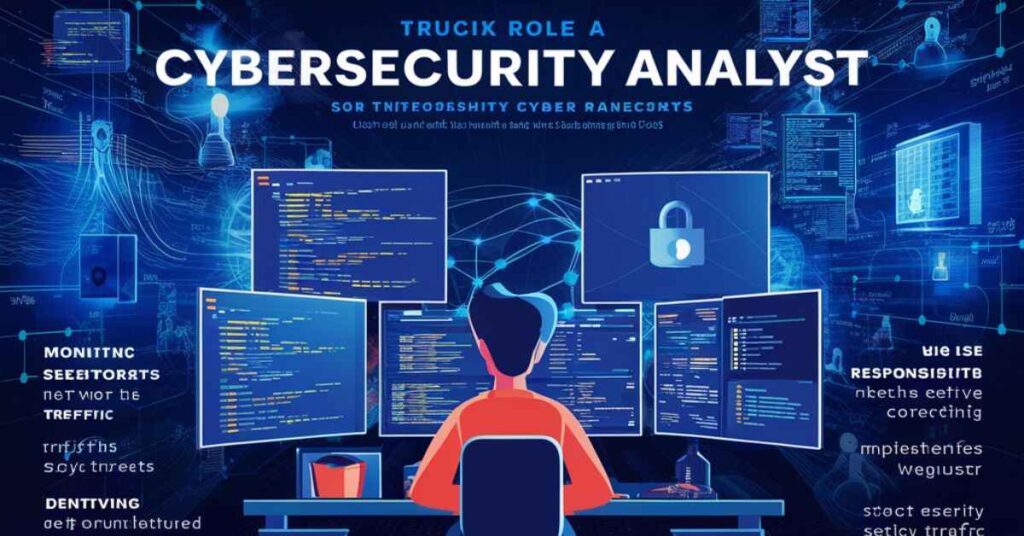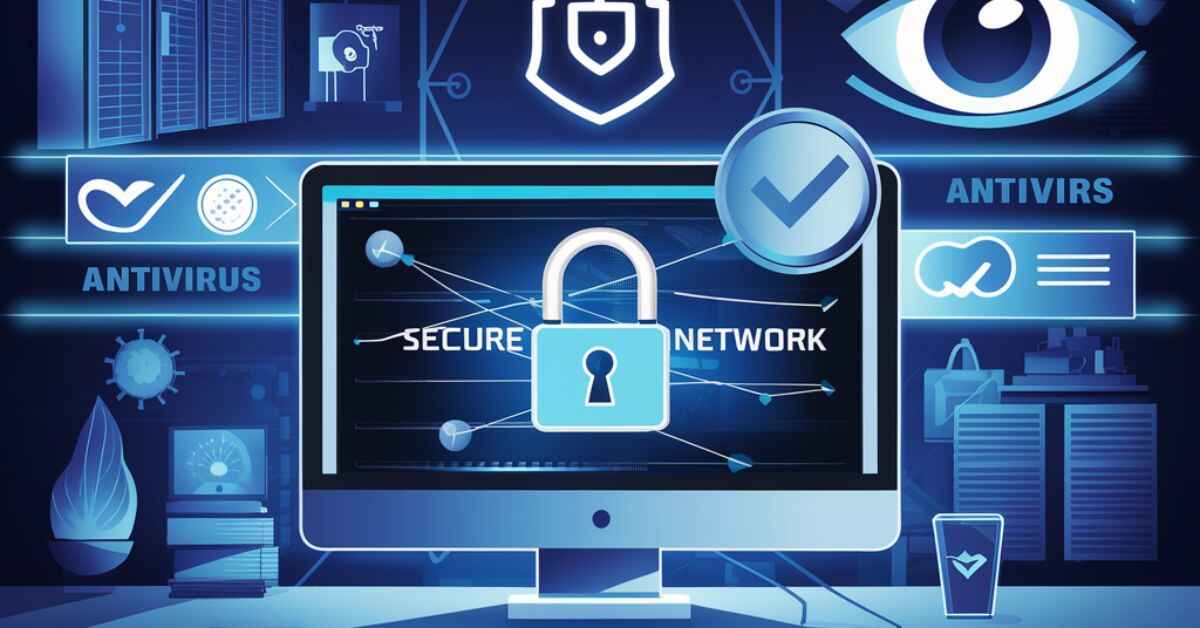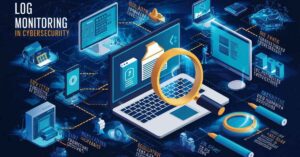In our increasingly digital world, the role of a cybersecurity analyst has become more vital than ever. As cyber threats evolve and multiply, these tech guardians stand on the front lines, protecting our digital assets and information. But what exactly does a cybersecurity analyst do? Let’s unpack this critical role and explore the skills, tools, and day-to-day responsibilities that make up this fascinating career. What Does a Cybersecurity Analyst Do? A Deep Dive into This Crucial Tech Role.
Core Responsibilities of a Cybersecurity Analyst
Cybersecurity analysts wear many hats, juggling a variety of tasks to keep digital systems safe. Let’s break down their key responsibilities:
Monitor Networks
Imagine a vigilant sentinel, constantly scanning the horizon for signs of trouble. That’s essentially what a cybersecurity analyst does in the digital realm. They keep a watchful eye on network traffic, looking for any hints of malicious activity.
- Real-time threat detection: Using advanced tools, analysts monitor network activity 24/7, ready to pounce on any suspicious behavior.
- Traffic analysis: They sift through mountains of data, identifying patterns that could indicate a breach or attempted attack.
- Identifying suspicious activities: From unusual login attempts to unexpected data transfers, analysts are trained to spot the red flags that others might miss.
Manage Software
A cybersecurity analyst’s toolkit is extensive and ever-evolving. They’re responsible for:
- Updating security programs to patch vulnerabilities
- Implementing robust firewalls to create a digital fortress
- Configuring intrusion detection systems to catch sneaky attackers
Think of it as constantly reinforcing and upgrading a castle’s defenses to withstand increasingly sophisticated siege weapons.
Test Security Systems
It’s not enough to set up defenses and hope for the best. Cybersecurity analysts actively probe their systems to find weaknesses before the bad guys do.
- Vulnerability assessments: Regular scans to identify potential weak points in the network.
- Penetration testing: Also known as “ethical hacking,” this involves attempting to breach the system to test its defenses.
- Risk analysis: Evaluating potential threats and their impact on the organization.
Report Findings and Develop Plans
A cybersecurity analyst’s job isn’t just about tech – it’s also about communication. They need to:
- Create detailed security reports that translate complex technical issues into language decision-makers can understand
- Present findings to stakeholders, making a case for necessary security upgrades or changes
- Develop incident response strategies to ensure the organization is ready for any digital emergency
Research Security Trends
The cybersecurity landscape is always shifting, and analysts need to stay one step ahead. This involves:
- Keeping up with the latest threats and attack methods
- Studying industry best practices and emerging technologies
- Engaging in continuous learning through courses, certifications, and industry events
“The only truly secure system is one that is powered off, cast in a block of concrete and sealed in a lead-lined room with armed guards.” – Gene Spafford
Despite this humorous quote, cybersecurity analysts work tirelessly to create the next best thing to this impossible standard of security. What Does a Cybersecurity Analyst Do? A Deep Dive into This Crucial Tech Role.
Cybersecurity Skills
To excel in this role, cybersecurity analysts need a mix of technical know-how and soft skills.
Cybersecurity Technical Skills
- Network security: Understanding the ins and outs of how networks function and how to secure them.
- Programming languages: Proficiency in languages like Python, Java, and C++ is often crucial.
- Operating systems: Deep knowledge of various OS, especially Linux.
- Cloud security: As more businesses move to the cloud, understanding how to secure these environments is essential.
Cybersecurity Soft Skills
- Problem-solving: The ability to think critically and solve complex puzzles is at the heart of cybersecurity work.
- Communication: Translating technical concepts into plain language for non-tech stakeholders is crucial.
- Teamwork: Cybersecurity is a team sport, often requiring collaboration across departments.
- Attention to detail: In a field where a single misplaced character in code can create a vulnerability, meticulousness is key.
A Day in the Life of a Cybersecurity Analyst
Every day is different in the world of cybersecurity, but here’s a glimpse into what a typical day might look like:
| Time | Activity |
|---|---|
| 9:00 AM | Review overnight security logs and alerts |
| 10:30 AM | Team meeting to discuss any pressing issues |
| 11:30 AM | Conduct vulnerability scans on network systems |
| 1:00 PM | Lunch break (while catching up on latest security news) |
| 2:00 PM | Update and patch security software |
| 3:30 PM | Investigate and respond to any detected threats |
| 5:00 PM | Lunch break (while catching up on the latest security news) |
Of course, this schedule can be thrown into disarray at any moment by a security incident, requiring all hands on deck to address the threat. What Does a Cybersecurity Analyst Do? A Deep Dive into This Crucial Tech Role.
Do Cybersecurity Analysts Code?
While not all cybersecurity roles require coding, many do. Coding skills can be a significant asset for a cybersecurity analyst, enabling them to:
- Automate repetitive tasks
- Develop custom security tools
- Understand and analyze malicious code
- Perform more effective penetration testing
Common programming languages used in cybersecurity include Python, JavaScript, C++, and SQL.

Python for Cybersecurity
Python has become a favorite tool in the cybersecurity analyst’s arsenal. Here’s why:
- Python is easy to learn: Its straightforward syntax makes it accessible even for those new to coding.
- Python is easy to debug: This saves valuable time when working on complex security scripts.
- Python is open source: A vast community contributes to its development and shares resources.
- Python’s library is extensive: There are numerous pre-built modules for various cybersecurity tasks.
- Python is multifunctional: It can be used for everything from data analysis to web scraping.
- Python is popular with hackers: Understanding the tools of potential attackers is crucial for defense.
Professional Certification and Learning Cybersecurity
To excel as a cybersecurity analyst, continuous learning is key. Here are some popular certifications and learning paths:
- CompTIA Security+: A great entry-level certification for those starting in cybersecurity.
- Certified Information Systems Security Professional (CISSP): An advanced certification for experienced professionals.
- Certified Ethical Hacker (CEH): Focuses on the mindset and tools of malicious hackers.
Many universities now offer degree programs in cybersecurity, and there are numerous online courses and boot camps available for those looking to enter the field or upgrade their skills.
FAQs
Q: What is the role of cryptography in cyber security?
A: Cryptography is crucial in cybersecurity, used to encrypt data, secure communications, and verify the integrity and authenticity of information.
Q: What is the job of a cryptography analyst?
A: A cryptography analyst designs, implements and analyzes cryptographic systems to ensure data security and privacy.
Q: What is a cryptography analyst?
A: A cryptography analyst is a specialist who works with encryption methods to protect sensitive information from unauthorized access.
Q: What is the role of a cybersecurity analyst?
A: A cybersecurity analyst protects an organization’s computer networks and systems from cyber threats through monitoring, testing, and implementing security measures.
Q: Does a cyber security analyst do coding?
A: While not all cybersecurity roles require coding, many analysts do use programming skills to automate tasks, analyze malware, and develop security tools.
Conclusion
The role of a cybersecurity analyst is complex, challenging, and ever-evolving. From monitoring networks and managing software to testing systems and staying ahead of the latest threats, these digital guardians play a crucial role in our increasingly connected world. As cyber threats continue to grow in sophistication and frequency, the demand for skilled cybersecurity analysts is only set to increase.
Become a Cybersecurity Analyst
If you’re intrigued by the world of cybersecurity and think you have what it takes to join the ranks of these digital defenders, here are some steps to get started:
- Build a strong foundation in IT and networking
- Learn key programming languages like Python
- Stay updated on the latest cybersecurity trends and threats
- Gain hands-on experience through projects or internships
- Consider pursuing relevant certifications
- Network with professionals in the field
Remember, the path to becoming a cybersecurity analyst is a journey of continuous learning and adaptation. But for those up to the challenge, it offers a rewarding career at the forefront of technology and security.
Thank you!
Thanks for diving into the world of cybersecurity analysts with us. As our digital landscape continues to evolve, these professionals will play an increasingly vital role in protecting our online lives. Whether you’re considering a career in this field or simply want to understand more about who’s guarding your digital assets, we hope this exploration has been enlightening. Stay safe out there in cyberspace.








